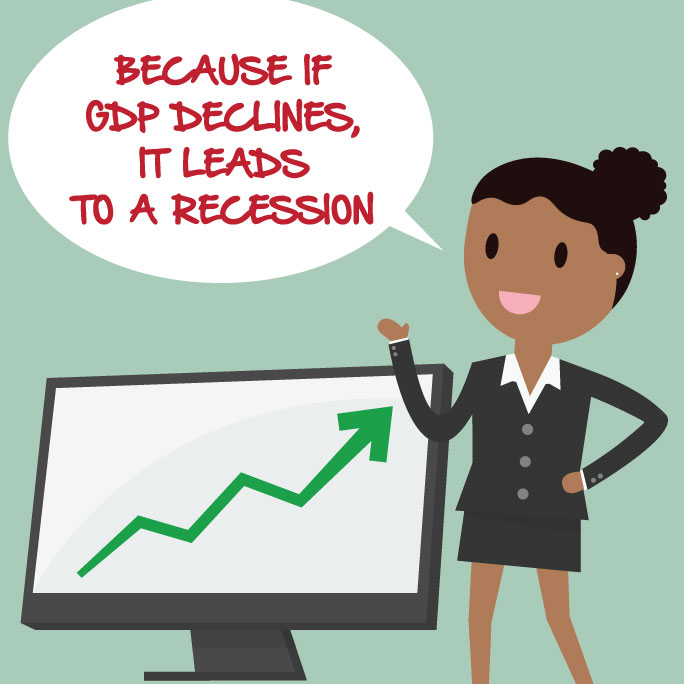Gross Domestic Product "GDP" 101
What is GDP? What does it measure? How does it affect us as Bahamians? If you have ever wondered about any of these questions, or just want to get a little more Money Smart, then read on, because this is where we break it down for you.
WHAT IS GDP?
The Gross Domestic Product (GDP) is the total dollar value of all goods and services produced in a country over a year. It is sometimes referred to as “the size of the economy” and includes all consumption, government spending, private investments and the foreign balance of trade (FBOT). Anything that is exported increases the overall GDP while anything that is imported is subtracted from GDP.
A country’s GDP is measured by its overall economic activity, whether private or public. Buying groceries at the food store, purchasing a car from an auto dealer, or buying a plane ticket to Miami for summer vacation are all examples of transactions that would be included in these calculations.
GDP VERSUS GNP
While the Gross Domestic Product (GDP) measures the overall economic activity of a country, the Gross National Product or "GNP" measures the total monetary value of the total output (exported goods) produced by its citizens. This means that any output produced by foreign residents of the Bahamas must be excluded when calculating our GNP, while any output produced by Bahamian citizens living abroad must be included.
The main difference between GDP and GNP is that GDP is calculated to include companies owned by foreign residents while GNP excludes the productivity of companies owned by foreign residents. GNP includes the calculations of companies owned by Bahamians who export goods to other parts of the world and send earned income to Bahamian residents.
LET'S BREAK IT DOWN
The chart below shows the segregated pro-rata 2017 Real GDP Values. This means that it shows exactly what makes up the total value of GDP for The Bahamas, as a percentage for each industry. Note that, although “Tourism” is the Bahamas’ number one industry, it is not represented in the chart because tourism's contribution to GDP covers such a large span of industries such as accommodation & food services, transport, real estate, construction etc.
A MEASURE OF RECESSION
A recession is two or more consecutive quarters of negative growth in GDP. It is recognized by a decline of all major macroeconomic contributors - GDP slowing down or going negative, decrease in industrial production, wholesale retail-trade activity, real income and employment rates.
Here's how it affects you: a decline in GDP can result in a recession, which will lead to higher prices. Higher prices generally drive businesses to reduce their operating costs, and jobs are usually the first thing to go. Fundamentally, it's very likely that your quality of life - the amount of spending that you can do, the amount of income you can potentially generate, and your general well-being - would suffer as the nation's GDP declines. Basically, it is very likely that the amount of spending that you can do, the amount of income you can potentially generate, and your general well-being would suffer as the nation's GDP declines.
HOW WE MEASURE UP
According to the latest (2016) statistics released by the International Monetary Fund (IMF), The Bahamas has a GDP with a total of $11.246 billion (International Monetary Fund 2016). To compare, Trinidad and Tobago has a GDP of $22.296 billion (2016); Jamaica with $14.002 billion (2016); Barbados with $4.764 billion (2016) and St. Kitts and Nevis with $0.900 billion (2016) total of GDP.
However, it should be noted that GDP per capita is considered a stronger measure of a country’s economic growth than GDP, as GDP per capita is a measure of the total value of goods produced divided by the population number. In other words, GDP per capita gives us the value of all goods and services produced by each person in The Bahamas in a given year. When comparing countries' our GDP per capita stands strong with a 2016 total estimate of $30,581K, while Barbados measures up with $16,993K, Trinidad and Tobago at $16,334K, St. Kitts and Nevis at $15,991K and Jamaica at $4,949K.
GDP 101 | GET MONEY SMART
A country’s economic growth is best measured by its GDP and GDP per capita. This includes (but is not limited to) inflation, employment rates, consumer spending, tourism growth, and company profits among other factors. Calculating the growth of the economy and the rate of its growth helps you as an individual to determine the amount you save or invest for the foreseeable future, as the GDP is a good indicator of an upcoming increase/decrease in inflation, unemployment, and interest rates. Understanding GDP will help to improve your financial literacy and get you on the road to financial success.




![GDP-in-The-Caribbean-[optimized].jpg](https://images.squarespace-cdn.com/content/v1/5a7b76ce9f8dce028587ea9d/1526569636848-I1FU64KSBEL1DJH8TTU5/GDP-in-The-Caribbean-%5Boptimized%5D.jpg)
